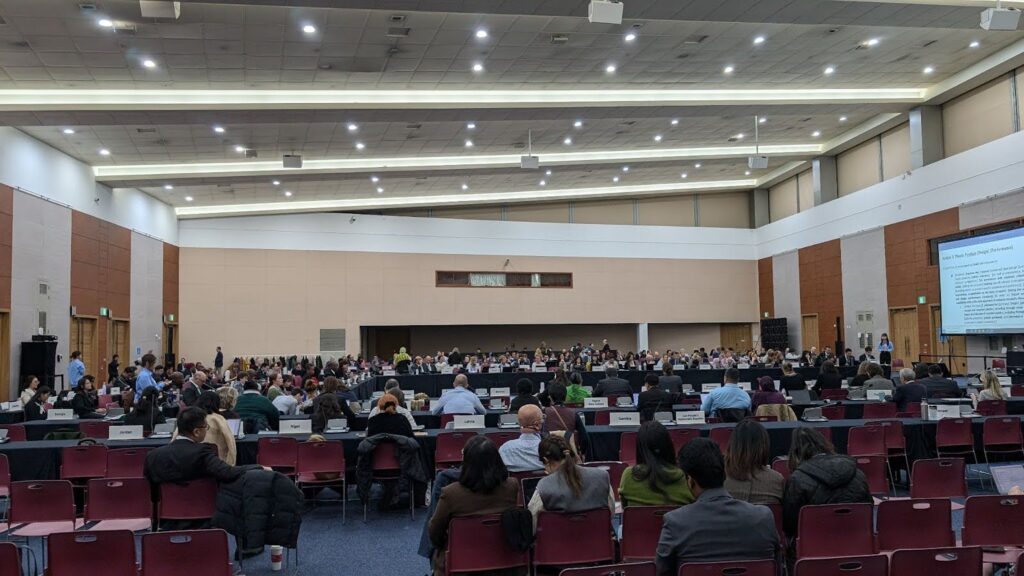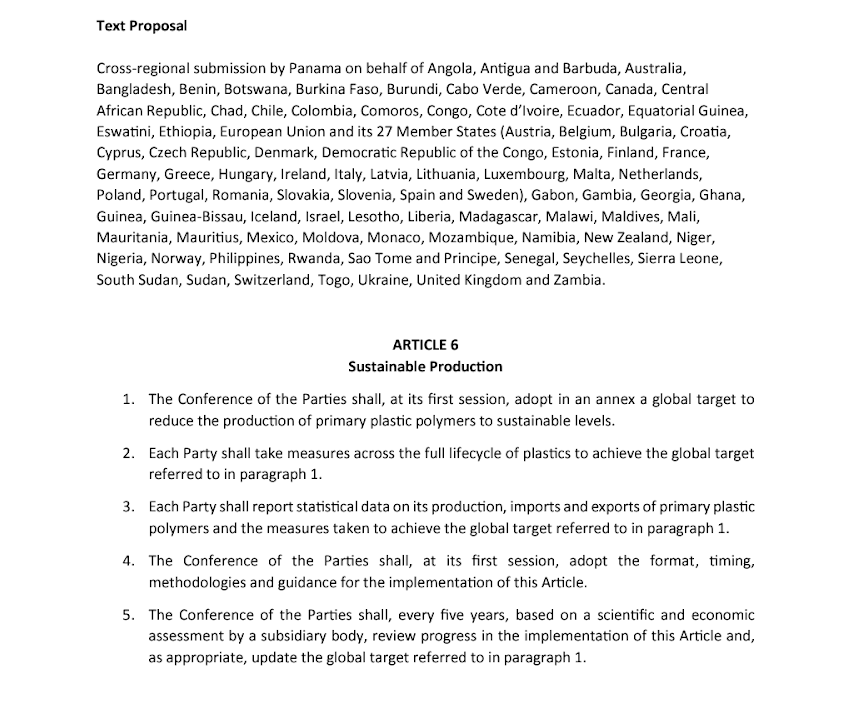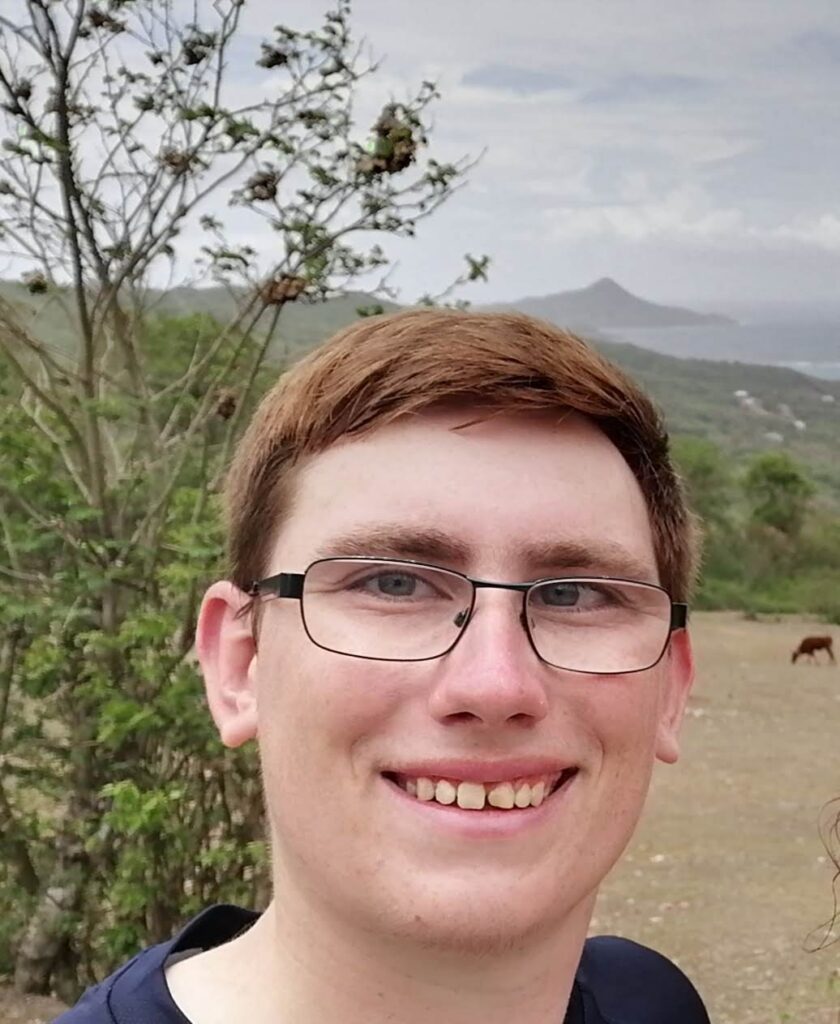A new way forward: Pressure builds at INC-5

Delegates arrived at Busan Exhibition & Convention Center (BEXCO) on Thursday morning to the news that the Chair has taken control of the process. No longer willing to sit back and allow the contact group deliberations to stumble along, making little to no progress. He has had enough. A new program of work has been forced through.
For Thursday, the committee has exceptionally been convening three parallel contact groups with the goal of speeding through consideration of all articles by 9 pm tonight. With this deadline now passed, the Co-facilitators will compile the outputs of all discussions and provide new text for each article to the chair. This will then be circulated as a Chair’s Non-Paper 4.0 by 12.30 pm Friday for consideration by members.
A controversial break from standard procedures
Unsurprisingly, this approach is highly controversial. It was agreed by the INC Bureau, an organisational panel composed of the INC Chair and ten regional representatives. However, the proposal was not put to members in a plenary session and involves breaks from established procedure. In particular, there is a precedent not to hold more parallel sessions than the number of delegates that UNEP funds for developing countries. This protects smaller delegations and ensures they can fully participate in the discussions. The strain on smaller delegations has been evident, and on Thursday, the room was noticeably quieter than at other times in the week.
The way that these negotiations are conducted matters. I believe the complaints from coalitions representing over 70 members that the approach lacks transparency and inclusivity are valid. The approach does not alter the time-consuming line-by-line discussion process and does not provide sufficient time to properly consider the articles. Therefore, the text forwarded to the chair contains numerous brackets and does not represent a text close to being ready for legal review. It is unclear how this approach will deliver an agreed text by the end of the week.

Disputed definitions and further delays
Upon hearing the approach, I was uncertain whether members would agree to proceed on this basis at all. Still, after 30 minutes of discussion, where the Co-Facilitators on Contact Group 1 did an admirable job of recognising the members’ concerns, while firmly directing them towards a productive conversation, members commenced substantive negotiations on an article on Definitions. Again, this is an article on which there is no proposed text by the Chair, though one member made a submission that was projected on screen and served as a basis for discussion.
Generally, there is a consensus around having a concise list with only essential definitions. Most members agree that ‘Plastics’, ‘Plastic Products’ and ‘Microplastics’ are essential, while some believe definitions of ‘Plastic Pollution’ and ‘Plastic Waste’ are needed. However, as readers will now have come to expect, the definitions themselves are contested. In particular, one coalition of members wishes to see the definition of ‘Plastic Pollution’ limited to pollution created by plastic waste, thereby excluding pollution created during the production and use of plastic products. This coalition also proposes extremely narrow definitions of ‘Plastics’ and ‘Microplastics’. A larger coalition of members supports more ambitious definitions, but there is little path for convergence between these opposing groups. There has also been blatant filibustering by multiple members of the committee, which has disrupted the course of discussions.
Compromise over consensus
Subsequent conversations have focussed on Product Design, Products of Concern and Chemicals of Concern. As a general note, these discussions have been lengthy, technical and have resulted in the addition of numerous new concepts, brackets and complexity.
There have certainly been moves toward convergence and compromise among members with similar viewpoints, further helped by informal consultations behind closed doors. These have been productive conversations, but it is unfortunate that they are occurring so late in the day, with so little time to finalise the text. There also remains a coalition of members unwilling to engage in these topics or wanting significantly weaker text, and there is still no clear path to consensus. There have also been procedural challenges to the discussions. A coalition of members has challenged whether these discussions should be occurring at all, preferring to discuss other articles. While a clear majority has supported the Co-Facilitator’s approach, these dissenters have sometimes disrupted discussions.
As the Contact Group concluded its work on Thursday evening, it is unclear what the Co-Facilitators compilation will look like, but it is clear that none of the articles will have consensus among all members. While I remain sceptical about the nuclear approach the Chair has adopted and feel that it could have been avoided with better management of the week’s negotiations, today has indeed marked a shift in the tone of discussions among most members. Notably, in convening informal discussions, the Co-Facilitators have supported members in beginning to generate consensus. This is particularly true for Article 3 on Products and Chemicals of Concern, where discussions this evening have been promising. As the Contact Group concluded its work, Panama announced that it had submitted a text proposal on Sustainable Production on behalf of nearly 100 members. This pragmatic proposal strikes a careful balance between ambition and realism, and to see such a large group uniting behind a text with not a single bracket is extremely exciting. Unfortunately, there will be a small but vocal group of countries that firmly oppose the text.

Intense sessions ahead to agree the Treaty in time
This afternoon the program of work for our last three days in Busan has been circulated to delegates, and it is clear that we are now going to enter an intense period of consensus building, primarily in informal discussions behind closed doors. After presenting his Non-Paper 4.0 to members, the Chair will see if there is consensus to begin forwarding text to the legal drafting group. If this consensus exists, a plenary session at 7 pm on Friday will be convened. However, I believe it is improbable that this will happen. If not, further informal discussions will be held, and a plenary is expected to be convened on Saturday evening to take stock of progress. It is then anticipated that Sunday will be spent in Plenary seeking to reach a final agreement.
It is becoming increasingly clear that members can now be split definitively into two categories. Those who are willing to find compromise on the text and seek to make progress. These members have hugely divergent views and national circumstances but recognise the urgency to converge on a text which is equally displeasurable to all parties, often the best indicator of a truly successful negotiation process. I believe this group represents a clear majority of the members. However, a small group of members appears unwilling to compromise. They will only accept voluntary measures addressing waste management. This is not the majority will of the committee, and it is unacceptable for such a small group to hold the process to ransom.
Discussion in the corridors has turned to how to make progress in this context. Is there a way to leave these dissenters behind and drive through an ambitious treaty? Is there enough time to find consensus among members willing to compromise? This will likely come down to political will. It is undoubtedly true that the chair has taken control of the process, but what this means for delivering a treaty text remains to be seen. Will he receive the backing from ambitious members, or will he be stood up, an isolated figure with no support from those he is trying to represent? If there was ever a time for the High Ambition Coalition to stand up, it has to be now.
Author’s Note: It is currently unclear how much information it will be possible to gain from the negotiations over the coming days. If information becomes available, I may share interim updates, but I anticipate that my next full-length post will be published after negotiations have concluded.

Author Biography – Sam Winton
I am a postgraduate researcher working for the Revolution Plastics Institute at the University of Portsmouth since its creation in 2020. In 2023 I commenced my PhD studies titled ‘To what extent has the structure and implementation of the INC process facilitated the development of an effective Global Plastics Treaty?’ at the University of Portsmouth and the University of Surrey. This research will focus on how the structure and implementation of the INC process impacts the treaty’s outcome, consider how the inclusion of stakeholders in the process influences a fair and just treaty, and investigate the implications of the final text for members. With a background in environmental hazards and community preparedness, my main research focus is working with communities and a broad range of stakeholders to tackle environmental challenges. I have also conducted work with international organisations with a view to creating policies to tackle the global plastics problem, and facilitate sustainable development.